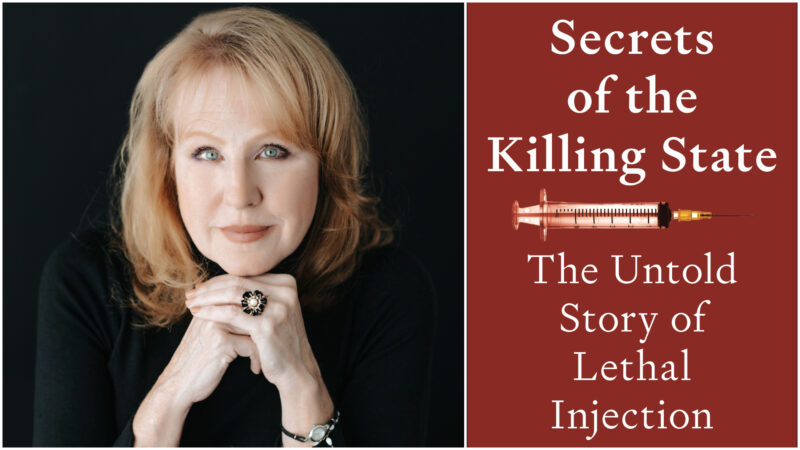Q&A: How lethal injection ‘hides the violence’ of executions in the South and elsewhere
Corinna Barrett Lain, a University of Richmond law professor, wrote a history of lethal injection and its use in U.S. capital punishment.
Alabama executed James Osgood by lethal injection in late April, the state’s second execution this year.
The state currently is making use of both lethal injection and its controversial nitrogen gas method to execute people on death row.
As the death penalty continues to make headlines across the South, the Gulf States Newsroom’s Kat Stromquist spoke to University of Richmond law professor Corinna Barrett Lain about her new book, “Secrets of the Killing State: The Untold Story of Lethal Injection.”
In the book, Lain explores how — and why — lethal injection came into use.
The following conversation has been edited for clarity.
I wanted to talk about this book about lethal injection that is a deep dive into, as you show, this really little-known subject. What captured your interest about this?
Well, I’m a death penalty researcher. And I kept seeing and reading about these botched executions. And that gave rise to a question: Why are states so bad at this?
We know how to put pets down. We know how physician assisted suicide works. So why are states so breathtakingly bad at lethal injection?
You give these accounts of botched executions by lethal injection across the country, which I think are really interesting, including botched executions in Alabama. You also spend a lot of time diving into the qualifications of prison staff. Is it that corrections and prison staff are trying to get this wrong?
People often ask me that! When they read the book, they’re like, are they trying to get this wrong?
It’s hard to attribute intent as a whole. You have a variety of actors across a variety of states. It’s possible that some of them are. I mean, it’s possible. We see in legislative hearings, some of the legislators saying, no, I don’t wanna do this, I want [people being executed] to feel pain.
But I think the more prevalent thing that is happening here is just a profound indifference. And I think that that comes with the fact that we are asking people to kill other people as part of their job. And it turns out that asking them to care about howthat is done is asking too much.
That actually kind of brings me to my next question. There’s this theme that keeps coming up throughout the book. You argue that lethal injection came about as the main way states execute people because it provides this appearance of humaneness, though, of course, it doesn’t always work out that way. Why is that appearance so important to states?
It’s important because it hides the violence. It’s not just the appearance of humaneness. It’s that lethal injection hides the violence of state killing.
It’s important to remember that until the body is ready to give up life on its own, until a person is naturally ready to die, it requires physical force to end life. It requires violence. So it might be a car accident. It could be a homicide. It could be an execution. But ending life before the body is ready requires violence.
And what’s special about lethal injection is that lethal injection hides the violence. And that’s a massive advantage for the executing state. It’s out of sight, out of mind. It makes the death penalty more of an idea that people can agree with or disagree with.
Most support for the death penalty is support in the abstract. Lethal injection keeps the death penalty abstract. It allows the political uses of the death penalty to flourish while hiding the brutality that executions entail.

It seems like the participation of doctors maybe would help. But doctors are in sort of a double-bind about participating in executions, right?
They are in a double-bind, in the sense that the age-old Hippocratic Oath tells them “do no harm.” But at the same time, they know that without their participation, you have extremely under-qualified people trying to do this.
That is the double-bind. But the thing is, what we are asking when we ask a medical professional to help is? As one doctor explained — it’s like asking a lifeguard to help someone drown better.
This is not what they went into the profession to do. It’s so fundamentally at odds with the entire profession, which is the healing profession, the saving profession. It is not the killing profession.
Here in the South, we’re beginning to execute people with nitrogen gas. You touch on this a little in your book, but do you think the same kinds of problems as with lethal injection could be in play?
Absolutely. What we see with nitrogen gas is like history repeating itself. Oklahoma was the first state to adopt nitrogen gas, even though Alabama is the first to actually use it. But Oklahoma adopted nitrogen gas based on a 14-page, double-spaced, unpublished report by three local college professors, none of whom had any scientific or medical background. And one of them later said, well, we couldn’t get any medical professionals to help us, so we just did the best we could.
And so, we see the same rollout, as in there’s no science behind this. We see the rollout in Department of Corrections directors [and] prison personnel coming out afterwards saying, “Oh, it was textbook. It was exactly what we expected. This went right,” [when] it absolutely did not. We see the same thing there.
We even see the same with producers of natural gas, which make gas for fire extinguishers and children’s balloons at parties. And they’re also saying, “We don’t want anything to do with this.” So we see the supply-side problems already starting to emerge.
Lethal injection and the death penalty is a very serious subject, but one thing I appreciated about this book is that it is written in a very approachable style and it’s even sometimes funny. What are you hoping that people take away from it?
I’m so happy that you appreciated that point, because it’s a dark topic, I know that. And I do use levity in the writing to make it a little more readable and interesting.
I think it would be hard to walk away from reading this book and think that lethal injection is this basically humane execution method that just goes wrong from time to time for reasons we don’t quite understand. No, that’s not it at all. I think it would also be hard to walk away from reading this book and to think that states can be trusted to kill at all.
And then there’s the question which I talk about in the epilogue of what do we do about the fact that so often by the time we get to an execution, this person is 17, 20 years away from their crime. The person who did that terrible thing — they’re not there anymore. It’s a frail old man being wheeled into the execution chamber in a wheelchair, or it’s somebody who started a prison ministry.
Studying executions really gave me, and I hope will give readers, a sense of who these people are at the end. Not who they were in their worst moment, not whom they were at the crime or the trial. Who are these people that we’re actually executing, and what effect does that have on the people that are asked to kill in the state’s name?
Well, that was fascinating. Thanks so much for talking with me.
Oh, thanks so much for having me. It was a pleasure.
This story was produced by the Gulf States Newsroom, a collaboration between Mississippi Public Broadcasting, WBHM in Alabama, WWNO and WRKF in Louisiana and NPR.
Auburn tabs USF’s Alex Golesh as its next coach, replacing Hugh Freeze on the Plains
The 41-year-old Golesh, who was born in Russia and moved to the United State at age 7, is signing a six-year contract that averages more than $7 million annually to replace Hugh Freeze. Freeze was fired in early November after failing to fix Auburn’s offensive issues in three seasons on the Plains.
Alabama Power seeks to delay rate hike for new gas plant amid outcry
The state’s largest utility has proposed delaying the rate increase from its purchase of a $622 million natural gas plant until 2028.
Former U.S. Sen. Doug Jones announces run for Alabama governor
Jones announced his campaign Monday afternoon, hours after filing campaign paperwork with the Secretary of State's Office. His gubernatorial bid could set up a rematch with U.S. Sen. Tommy Tuberville, the Republican who defeated Jones in 2020 and is now running for governor.
Scorching Saturdays: The rising heat threat inside football stadiums
Excessive heat and more frequent medical incidents in Southern college football stadiums could be a warning sign for universities across the country.
The Gulf States Newsroom is hiring an Audio Editor
The Gulf States Newsroom is hiring an Audio Editor to join our award-winning team covering important regional stories across Mississippi, Alabama and Louisiana.
Judge orders new Alabama Senate map after ruling found racial gerrymandering
U.S. District Judge Anna Manasco, appointed by President Donald Trump during his first term, issued the ruling Monday putting a new court-selected map in place for the 2026 and 2030 elections.









